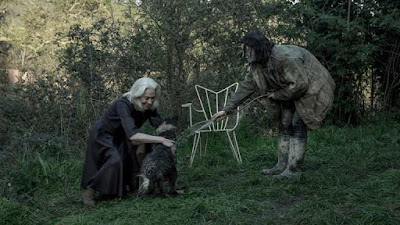Although Spanish film-maker Ramon Salazar’s exquisitely
crafted feature-film Sunday’s Illness (‘La Enfermedad del Domingo’, 2018) has had a Netflix
release and screened at this year’s Berlin Film Festival, it has so far seems
to have a muted reception. It could very well be one of the hidden gems of 2018
and would listed as such while reminiscing on the year’s cinema. On the outset
Sunday’s Illness looks like an unambiguous, melancholic family drama, a
mother-daughter reunion with its own miasma of emotional baggage. But what stops
the movie from getting shuffled among the array of parental reunion dramas are the
beautiful display of craft and irrefutably outstanding performances.
Ramon Salazar’s characters never explicitly state anything and
his visual approach too hints at possible developments through neatly
constructed foreshadows. He opens the movie in dense woods, capturing the
large, intimidating trees whose firm roots courses through earth like veins. A
woman slowly walks through the forest and stands looking at the hollowed-out
space of a gigantic tree trunk. The shot cuts to a palatial mansion. An
immaculately dressed elderly woman walks with an air of authority to her dining room. Her
heel catches up with the gown and she briefly stumbles. A gaze into a sort of
abyss and an unforeseen stumble hints of what’s to come. There’s something
unsettling and eerie in director Salazar’s tone at least for the first
half-hour. It nearly appears to be an art-house revenge/horror flick that may
reveal its sinister core any time. Nevertheless, the narrative takes a more
emotional approach; the lack of overt showcase of feelings and long silences
may seem dry for some, but I felt that it’s part of the narrative’s authentic,
powerful emotional force.
Wealthy Barcelonian socialite Anabel (Susi Sanchez) has
hired a team of waiters for her lavish charity dinner. She curtly briefs them
on the code of conduct. Chiara (Barbara Lennie) is one of the waiters. Her
presence upsets Anabel for unknown reasons. It turns out that Anabel is
Chiara’s mother whom she abandoned 35 years earlier (when Chiara was 8 years
old). Chiara has grown up with her father, but the mother’s abandonment has
profoundly affected her in myriad ways. Anabel has married again and basks in
high-profile life-style with husband Bernabe. Later, Anabel meets Chiara
and hears her daughter’s strange request: to spend 10 days at her rural home, situated in the
picturesque and isolated French Pyreenes. Anabel and her husband don’t know what to make of
this request and they engage a lawyer to make Chiara sign a contract. Chiara
agrees to not make contact with her mother after the 10-day stay. The mother
and daughter leave the city behind, and the narrative follows them testing the
complexities involved in their strained relationship. Anabel also persistently
wonders about the real reason for Chiara’s request (of course the hint is laid
bare in the title).
The initial, unspoken eeriness generates plenty of emotional
tension. The threat of violence (the dying seagull) and psychological torture
(the false story about the dog abandoned in a well) heavily hangs in the air. Moreover, the glacial pace combined with the atmosphere of silence and festering
resentment subliminally points out to inevitable explosion of emotions. But our
early suspicions gradually disintegrate as the mother & daughter bring down
those figurative armors and face masks to allow deep feelings of compassion and
resilience to slightly change their composure. The self-destruction, confusion, anger and anguish
that’s pervaded Chiara’s life for 35 years charges each scene with powerful
emotional undercurrent which is encountered by Anabel with a bit of
gracefulness, stoicism, and remorse. Mistrust and anger is never fully dispelled from
their damaged relationship, although it’s riveting to watch them comprehending
each other’s emotional baggage.
DP Ricardo de Gracia and director Salazar's carefully
calculated design of tone and images may feel a bit schematic at times. However,
the topnotch performances at the center retain the narrative’s ethereal quality
from first till end. Susi Sanchez and Barbare Lennie’s ability to bring
emotional complexity with sparse dialogues stands as a testament to the film’s
brilliance. I liked the carnival scene, where Anabel first watches Chiara
joyfully riding a carousel and later whisks her drunken daughter from a
groping, drunk stranger. Lennie devastatingly expresses her character’s
yearning for rescue and Sanchez’ subtly conveys the power of parental
connection. Then there’s a long, wordless shot of mother & daughter riding
a high-speed monorail through the forest which evokes set of emotions that
couldn’t easily be put into words (if the scene is a metaphor for ‘something’ I
couldn’t figure it out).
Salazar’s writing
never let the characters to be ruled by their emotions. He doesn’t pretend to
divulge 35 years of buried feelings in the span of 10 days. Yet the director
fleetingly discloses some of the emotions in a creative and indirect manner. For
example, the scene Anabel starts dancing, thinking that Chiara is not at home.
Her face is stern and her moves are awkward, but slowly the hard shell seems to
crack and she seems to search for liberation/emotional release through the
dance movements. Even the two characters’ contrasting costume choices tells a
lot about them (Chiara wears out-dated dress since she’s still stuck at the
time her mother left). The wondrous aesthetics keeps us in its grip even when
the story takes a foreseeable path. Be it the dilapidated farmhouse or the
bright interiors of a French restaurant, the images appears like an enchanting
painting. The elegant scene transition that employs the sound of a shutter is
equally fascinating, bestowing the feel of observing snapshots of
mother-daughter’s emotional evolution. In the end, Sunday’s Illness may not
have a strong puzzle to make us entirely surprised by its final revelation, but
the extraordinary performances and stunningly beautiful visuals garnered my
full attention.




No comments:
Post a Comment